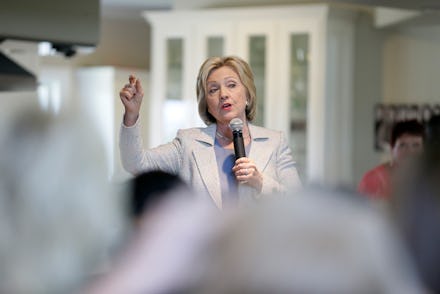Hillary Clinton Just Released Her First Major Climate Change Proposals

Hillary Clinton has released the first two major policy proposals for her vision for tackling climate change and ensuring the United States' primacy as the "world's clean energy superpower."
The plan, which she announced through a video released on Sunday, sets forth two enterprising goals. Her first commitment is a pledge to have more than half a billion solar panels installed across the country by the end of her first term in office. Her second objective is to power every home in the U.S. with clean renewable energy within a decade of her arrival in the White House.
The Clinton campaign also outlines her plan to form a "Clean Energy Challenge" that would create a network of partnerships between the federal government and states, cities and smaller communities to incentivize investment in renewable energy with grants.
The proposals are only the first of a number of climate policy commitments expected to emerge from Clinton's campaign in the coming months, but already some progressive outfits have responded with cautious optimism to her opening rhetoric.
The plan: Clinton's solar panel agenda would boost the amount of installed solar capacity by 700% by 2020 — the same as "rooftop solar systems on over 25 million homes," according to the campaign.
Her commitment to increasing the amount of renewable energy in the U.S. would double the share of renewables in overall power generation. Currently, renewable energy accounts for about 16% of total power generation in the country; Clinton's 10-year plan would increase that to 33% by 2027. Clinton's camp points out that that's eight percentage points higher than called for under the Obama administration's forthcoming "Clean Power Plan."
In her video announcing the proposals, Clinton takes aim at Republicans who deny climate change and singles out Jeb Bush's comment saying "I'm not a scientist" before describing himself a "skeptic" of global warming.
"It's hard to believe there are people running for president who still refuse to accept the settled science of climate change — who would rather remind us they're not scientists than listen to those who are," Clinton says in the video. "You don't have to be a scientist to take on this urgent challenge that threatens us all, you just have to be willing to act."
The reaction: Clinton's message was received fairly well by a number of players in the climate policy field.
Tom Steyer, the head of NextGen Climate, offered vague but warm encouragement on Clinton's ideas in a statement issued by the Clinton campaign: "Today, Hillary Clinton emerged as a strong leader in solving the climate crisis and ensuring our country's economic security. Clinton laid out an ambitious framework to put our nation on a path to a clean energy economy that will create millions of jobs."
Steyer's opinion carries weight for Democratic candidates: His support is accompanied by vast amounts of cash. Steyer is a former hedge fund manager and was the single biggest public spender in the 2014 elections. According to the New York Times, in order to win the backing of his super PAC, a candidate "must pledge to enact an energy policy that would lead to the generation of half the nation's electricity from renewable or zero-carbon sources by 2030... and 100% from clean sources by 2050." When combined with nuclear energy, Clinton's 10-year plan for growing renewable energy more than meets Steyer's 2030 benchmark, as Clinton press secretary Brian Fallon pointed out on Twitter:
Some other climate policy groups praised Clinton's stance on renewable energy, but emphasized that she has yet to prove her mettle on combating fossil fuels.
"Clinton is half the way there — this is a credible commitment to renewable energy, and a recognition that the economics of electricity are changing fast," 350.org co-founder and climate change activist Bill McKibben said in a statement emailed to Mic. "Now, we need Clinton to show she understands the other half of the climate change equation — and prove she has the courage to stand up against fossil fuel projects like offshore and Arctic drilling, coal leasing in the Powder River basin, and the Keystone XL pipeline. Because at the end of the day, growth in renewables doesn't mean enough if we're simultaneously kicking the decarbonization can down the road with more pipelines and more extraction on public lands."
In the past, Clinton has angered green activists with her work on a variety of climate-related issues. But this time around, it seems like her campaign is off to a decent start on the issue.